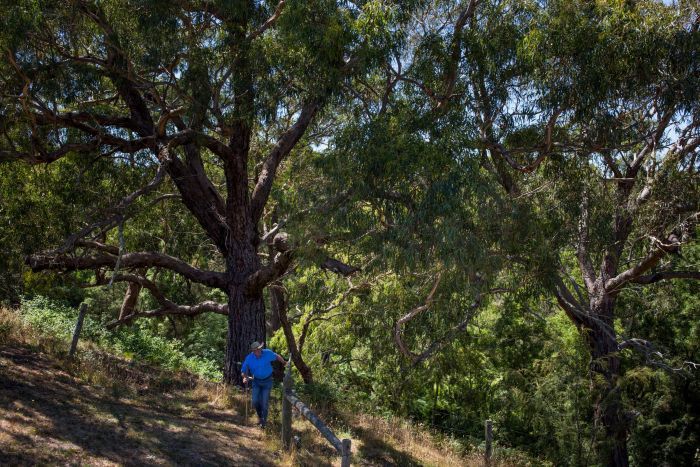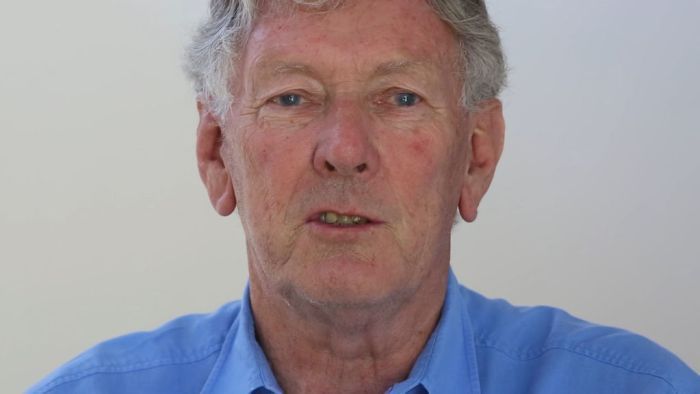Life after Black Saturday: 'Victoria's never been in a more dangerous situation'
Updated
 Photo:
David Packham amongst the bush on his property in Rosedale, in Victoria's Latrobe Valley. (ABC News: Jane Cowan)
Photo:
David Packham amongst the bush on his property in Rosedale, in Victoria's Latrobe Valley. (ABC News: Jane Cowan)
In part two of Jane Cowan's seven-part series revisiting some of the people touched by Victoria's devastating Black Saturday bushfires, she speaks to scientist David Packham, who fears the state is more vulnerable to a bushfire tragedy than ever before.
At 3:00am on the Thursday before Black Saturday, David Packham woke up with a bad feeling.
At his computer, an analysis of the weather data — high level information he could access because he once worked as a bushfire scientist at the Bureau of Meteorology — did nothing to dispel his uneasiness.
"What I saw just terrified me," he remembers.
"The fire danger index was right through the roof. I remember saying, 'I hope I'm wrong about this'. It was clear it was going to be a monumental day."
What has happened in the eight years since Black Saturday infuriates David's scientific mind — it has been applying itself to bushfires since the 1960s when, as a chemist, he first came to understand the physics in terms of heat and mass transfer.
"I have a lot of suppressed anger about all this. But what can I do?"
He hesitates to call it paranoia. But certainly, a preoccupation. A sense of impending, preventable disaster.
"The situation is very, very serious. This state has never been in a more dangerous situation in the last 30,000 years. We are sitting, truly, on a little pile of gun powder and smoking cigarettes.
"What we are looking down is the fires that have taken place that culminated up into Black Saturday, fundamentally all the early ones which burnt about a third of the state in 2003 and 2007, all took place north of the ranges in areas where there weren't too many people exposed.
"Black Saturday exposed a few more, but not really great numbers, compared to places like say Eltham, Warrandyte where you have not a few hundred or the odd thousand but tens of thousands of people exposed."
David fears there could also be massive environmental damage.
"As the Indigenous people are so correctly saying, [the bush] needs so much healing. Ever since human occupation here — 30, 40, 50,000 years — it's never been like this. We are sitting in a terrible situation."
The Packhams' house in Rosedale, in Victoria's Latrobe Valley, contains an extensive library of bushfire-related books and reports. In truth, there's little need to consult the shelves: David's memory is encyclopaedic.
In retirement, life is full. There is flying his French-made plane, the yacht docked in Paynesville, black and white photography. Not to mention the four acres of grapevines to tend.
The 77-year-old lives on 17 hectares that encompass both river flats and a patch of the last remnant rainforest for possibly 50 kilometres around. In the fern gullies, he's waging a constant battle against blackberries and wombats.
Perhaps somewhat curiously for someone so attuned to the bushfire threat, he's chosen to live directly opposite a massive pine plantation.
The forest represents an enormous fuel source that starts 75 metres from his front door and stretches for 20 to 30km in each direction.
Since Black Saturday, David has been issuing his own fire weather predictions via an email list of subscribers, a practice borne out of a sense that the public wasn't getting accurate, unfiltered information on which to base their decisions on high-risk days.
He says the official messaging has improved, but laments that bushfire policy is still far from adequate, particularly when it comes to preventative burning.
"One of the most difficult things about this issue is there is no acceptable political solution. The only solution that is going to work is to do what the Aborigines did for tens of thousands of years," he says.
"That is totally unacceptable to urbanised Victorians. They do not understand fire. They do not understand the role of fire in the environment, the necessity of fire."
Part three: royal commission lawyer Jack Rush
First posted








